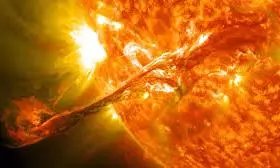
Powerful X-class solar flare disrupts radio signals in Southern Africa
text_fieldsA powerful X-class solar flare erupted from sunspot region 3912 on December 8, at 4:06 a.m. EST, causing radio blackouts across southern Africa.
The flare, one of the strongest of its kind, was accompanied by a coronal mass ejection (CME) and marked another significant event in the current solar cycle.
The flare ionized the Earth’s upper atmosphere, leading to disruptions in high-frequency radio signals. The region most affected was southern Africa, which was exposed to direct sunlight during the flare's peak. According to NOAA's Space Weather Prediction Center, the ionization increased atmospheric density, absorbing radio waves and weakening long-distance communications.
The CME linked to the flare is expected to graze Earth, possibly causing minor geomagnetic disturbances. Dr. Tamitha Skov, a space weather physicist, indicated that the CME is likely to pass Earth to the west, with fast solar wind streams potentially pushing it further off course. She predicts mild effects may be felt by December 11.
Solar flares are powerful bursts of electromagnetic radiation emitted by the Sun. They are categorized into five classes—A, B, C, M, and X - based on intensity, with X-class being the most potent. These flares have the potential to significantly impact satellite operations, navigation systems, and communication networks.
This recent flare is indicative of the Sun's active phase in the current solar cycle, heightening the likelihood of similar events in the near future.












